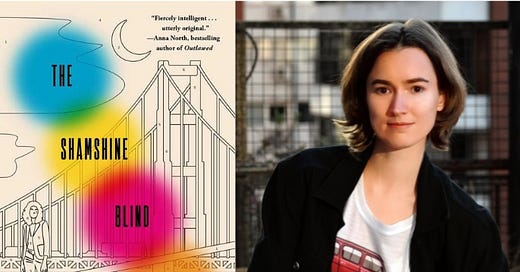Subscriber, I only run author podstacks back-to-back if I’m either on deadline crunchy-crunch time or the conversation was so good that I simply can’t resist. And this podstack is a special case in which both are true!
Regarding the deadline(s): there will some Big News to share with you all down the line, news so big that I almost want to put on my newsboy cap1 and stand on various street corners hocking papers. Get yer paper here! Read all ‘bout it! Big, exciting shake-ups in Frumkinland! But alas, in the interest of good taste, my newsboy-ing will have to wait.
Regarding the podstack: I have been veritably obsessed with Paz Pardo’s dystopian cyberpunk noir, The Shamshine Blind, since it came out in 2023. Paz and I swiftly became friends online, and just last week Zoomed for the first time about this twisty, surrealist sci-fi thrillshow that will make you think twice about where your feelings come from.
An Argentine-American novelist and playwright, Paz is a canny hybridizer of many literary and cultural traditions. The American police procedural meets William Gibson’s Neuromancer meets psychoanalytic theory meets anti-authoritarian revolt in Shamshine, whose special agent Kay Curtida is tasked with protecting San Franciscans against the influence of psychopigments — basically, psychoactive paints that induce emotional states in their users.
Among the many things Paz and I spoke about in our pleasantly labyrinthine — dare I say Borgesian? — conversation was America’s new favorite buzzword: fascism. As in a frequently nationalist/militarist/autocratic system of government that seeks to turn its citizens into subjects of authoritarian control via the strict policing of many aspects of civic and social life, the deliberate distortion of information, and the brutal discipline of behavior that is deemed seditious against the state. Paz and I spoke about how actual fascism looks like more than someone leaving an angry comment on a blog post or using the wrong pronouns: it’s deliberately coercive, its consequences are more often than not material (i.e. the murders and disappearings of roughly 30,000 Argentinians between 1974 and 1983), and it’s frequently difficult to recognize as fascism when you’re in the midst of it.2
One of the many fantastic aspects of Shamshine is its portrayal of dystopic authoritarianism not as culture-warring on turbo drive but as a mounting sense of fear and confusion — the idea that you are being pulled outside yourself, that something as basic as your emotional state may not belong to you, and that what you once knew to be true now seems eerily unfamiliar.
I hope you’ll enjoy our conversation, and order a copy of The Shamshine Blind when you get the chance! (And if you really enjoy this chat, why not sign up for Paz’s eight-week novel-writing class?)
I look good in a lot of hats but I really don’t look good in these. This is a sacrifice that I’d be making for you, subscriber.
Think of the slow transformation of daily life in the first season of the TV adaptation of Margaret Atwood’s Handmaid’s Tale. The U.S. doesn’t turn into Gilead overnight: instead, laws of escalating absurdity are imposed, women’s rights are increasingly circumscribed. Democracy dies by a thousand little paper cuts.





